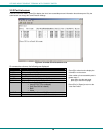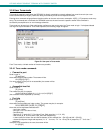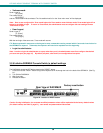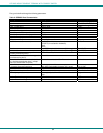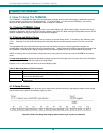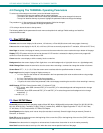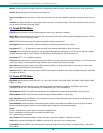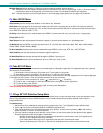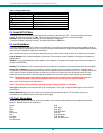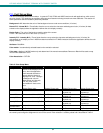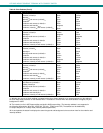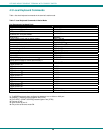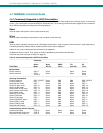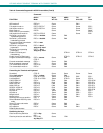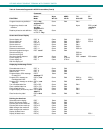
NTI RACK MOUNT CONSOLE TERMINAL WITH CONSOLE SWITCH
36
Table 4- Programmable Keys
Enhanced PC-Style Keyboard Enhanced PC-Style Keyboard
F1 through F12 ENTER (Both ENTER keys are programmable)
(UP ARROW)
ESCAPE
(DOWN ARROW)
HOME
(LEFT ARROW) INSERT
(RIGHT ARROW) PAGE DOWN
BACKSPACE PAGE UP
DELETE PRINT SCREEN
END TAB
F8- Ansbk SET-UP Menu
A message of up to 20 characters can be programmed to identify the terminal to the CPU. Enter the message at the cursor
position. Correct errors by pressing < > (left arrow) to delete characters or <Home> to clear the message.
CONCEAL hides the answerback message, so it is not displayed in setup mode.
To save the message in nonvolatile memory, exit Setup mode with the YES option.
F9- Lan Setup Menu
This menu configures the terminal for Ethernet communication. Use of Ethernet communications provides the additional ability to
open multiple sessions (applications) on one or more CPUs/servers at the same time. Support of these extended features requires
the server to be configured to accept telnet connections.
Note: The Ethernet option in the F4 setup menu must be set to ON for the terminal to work in an Ethernet environment.
Local IP Address is the IP address assigned to this terminal. This must be a unique IP address. An example of this address is
200.200.200.10.
Netmask is a value generated by the system based on the IP address. The system administrator would have this information. An
example is 255.255.255.0
Gateway This IP address is used to communicate with other networks. If a gateway is not being used this option should be blank.
Remote IP 0...B Address are for any remote CPU, or devices, that the terminal will communicate with for a specific session.
These twelve remote IP addresses should all be identical if all communications will be with only one CPU. If Multiple sessions-ON
in the F4 menu has been selected, and there is more than one CPU on the system, the user must specify which CPU each
session will communicate with. To communicate with a different CPU for a future session, these settings must be changed.
Note 1: The Multiple session option allows 8 separate sessions if any emulation other than ECON-80 is selected. If
ECON-80 emulation is selected, the Multiple session option will then allows 12 separate sessions.
Note 2: Port 23 Is the telnet service by default.
Note 3: The terminal must be powered cycled after saving for these parameters to take effect.
Term Type allows definition of the terminal with up to 40 characters. If Term Type is empty the default type is sent to the CPU
by the system.
Ethernet Node ID displays the serial number of the hardware Ethernet interface device. This is a default value of the
manufacturer of the hardware device and should not be changed.
F10- Colr1 Set-up Menu
Selects the color palette to be used for each screen attribute. A text sample of the selected colored is displayed next to each
selection. Attribute selections are listed below.
Normal
Dim
Blank
Blink
Blink Blank
Rev
Rev Blank
Rev Blink
Rev Blink Blank
Undl.
Undl. Blank
Undl. Blink
Undl. Blink Blank
Undl. Rev
Undl. Rev Blank
Undl. Rev Blink
Undl. Rev Blink Blank



